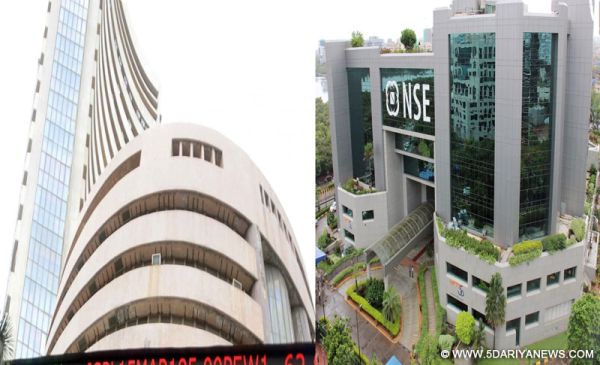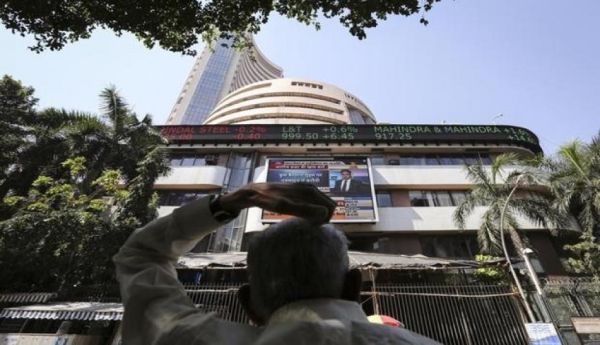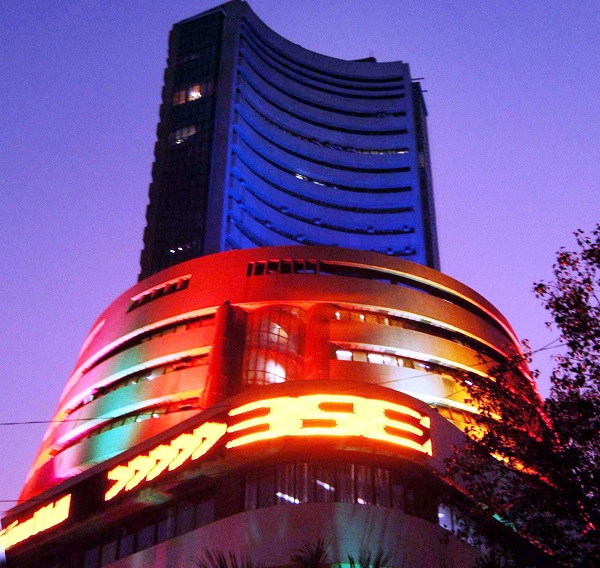
by admin | May 25, 2021 | Economy, Markets, News
 Mumbai : A massive bout of profit bookings subdued the key indices of the Indian equities markets to close on a flat note after touching their record new intra-day highs on Friday.
Mumbai : A massive bout of profit bookings subdued the key indices of the Indian equities markets to close on a flat note after touching their record new intra-day highs on Friday.
Market observers said that expectations of healthy quarterly results and buying support for the auto and banking stocks had lifted the key indices.
On intra-day record high basis, the barometer 30-scrip Sensitive Index (Sensex) of the BSE touched 33,286.51 points, while broader 50-scrip Nifty at the National Stock Exchange (NSE) reached 10,366.15 points.
The NSE Nifty50 slipped by 21 points or 0.20 per cent to close at 10,323.05 points.
However, the Sensex of the BSE, which opened at 33,228.32 points, closed at 33,157.22 points, higher by 10.09 points or 0.03 per cent from Thursday’s close at 33,147.13 points.
The Sensex had touched an intra-day low of 33,164.42 points-mark.
“Nifty ended lower on Friday as selling pressure emerged in the afternoon session,” said Deepak Jasani, Head – Retail Research, HDFC Securities.
“Major Asian markets have ended on a positive note, barring the Jakarta and Taiwan indices. European indices like FTSE 100, CAC 40 and DAX are traded higher.”
According to Anand James, Chief Market Strategist, Geojit Financial Services: “Domestic indices remained volatile within a narrow range as a mixed bag of corporate numbers and profit booking in PSBs crippled the market’s momentum.”
“However, optimism in pharma and FMCG stocks guarded the key support levels. Small and midcap stocks continued to show strength ahead of MSME’s meeting with the GST council scheduled on Sunday.”
In terms of investments, provisional data with the exchanges showed that foreign institutional investors (FIIs) sold scrip worth Rs 640.95crore, whereas domestic institutional investors (DIIs) invested stocks worth Rs 56.57 crore.
On the currency front, the rupee weakened by 22 paise to close at 65.05 against the US dollar from its previous close at 64.82-83.
Sector-wise, the S&P BSE healthcare index surged by 223.88 points, followed by the automobile index higher by 214.01 points and the consumer durables index augmented by 50.79 points.
On the other hand, the S&P BSE banking index receded by 233.70 points and oil and gas index declined by 191.25 points while the telecom index inched-down by 84.14 points.
Major Sensex gainers on Friday were: Adani Ports and Special Economic Zone, up 4.31 per cent at Rs 431.85; Sun Pharma, up 3.65 per cent at Rs 550.35; ONGC, up 3.53 per cent at Rs 183.55; Tata Motors DVR, up 3.10 per cent at Rs 237.70; and Tata Motors, up 2.55 per cent at Rs 430.05.
Major Sensex losers were: Bharti Airtel, down 4.98 per cent at Rs 485.10; State Bank of India, down 3.03 per cent at Rs 310.95; Reliance Industries, down 1.88 per cent at Rs 929.45; Wipro, down 1.74 per cent at Rs 296.60; and NTPC, down 1.19 per cent at Rs 182.45.
—IANS

by admin | May 25, 2021 | Economy, Markets, News
 Mumbai : Samvat 2074, marking the start of the Hindu New Year on Thursday, saw both key indices of the Indian equities markets recede as rise in geo-political tensions in the Korean peninsula along with fears of higher non-performing asset (NPA) levels of the domestic banking sector eroded investors’ risk-taking appetite.
Mumbai : Samvat 2074, marking the start of the Hindu New Year on Thursday, saw both key indices of the Indian equities markets recede as rise in geo-political tensions in the Korean peninsula along with fears of higher non-performing asset (NPA) levels of the domestic banking sector eroded investors’ risk-taking appetite.
The hour-long session is held every year on Diwali to mark the start of the Hindu New Year.
According to market observers, the special session to mark Samvat 2074, witnessed heavy selling pressure in the banking, metals, auto and oil and gas stocks.
The Nifty 50 of the National Stock Exchange (NSE) receded by 74.95 points or 0.73 per cent to 10,135.90 points.
Similarly, the 30-scrip sensitive index (Sensex) of the BSE plunged during the intra-session trade.
The S&P BSE Sensex, which opened at 32,656.75 points, traded at 32,373.98 points (at 7.15 p.m) — down 210.37 points or 0.65 per cent from Wednesday’s close at 32,584.35 points.
The Sensex touched a high of 32,663.06 points and a low of 32,341.10 points during the intra-session trade.
In Samvat 2073, the barometer index (BSE Sensex) had gained 4,654 points or 16.6 per cent whereas the NSE Nifty 50 had risen by 1,585 points or 18.4 per cent.
“In line with the festive mood the key indices opened higher but soon pared their gains,” Deepak Jasani, Head – Retail Research, HDFC Securities, told IANS.
“Gains in telecom shares were offset by losses in banking sector stocks and metal stocks,” he said, adding that investors continued to be worried over an expected rise in the slippages and NPA levels.
“Samvat 2074 opened on a flat and then plunged into the red, following global trends, as tension have risen once again between North Korea and the US,” Dhruv Desai, Director and Chief Operating Officer of Tradebulls, told IANS.
On Wednesday, a massive sell-off in the banking sector stocks had pulled the key Indian equity indices lower. The 30-scrip Sensex had closed 24.81 points or 0.08 per cent lower and the Nifty 50 closed 23.60 points or 0.23 per cent down.
The special trading session held every year on Diwali is considered to be auspicious for stock market trading. It is believed that the “Muhurat” trading on this day brings wealth and prosperity throughout the year.
This ritual has been observed for ages by the trading community.
—IANS

by admin | May 25, 2021 | Corporate, Corporate finance
 Mumbai:(IANS) The bulls, it appeared, were back on the saddle at Indian equities markets, helping two key indices to register a spike of nearly 2.5 percent during the trading week ended Friday, buoyed by status quo in US interest rates and signs of easier monetary policy back home.
Mumbai:(IANS) The bulls, it appeared, were back on the saddle at Indian equities markets, helping two key indices to register a spike of nearly 2.5 percent during the trading week ended Friday, buoyed by status quo in US interest rates and signs of easier monetary policy back home.
The sensitive index (Sensex) of the Bombay Stock Exchange closed Friday at 26,218 points, up 608.70 points or 2.38 percent over the previous week’s close at 25,610.21 points. The Nifty of the National Stock Exchange (NSE) gained 192.60 points or 2.47 percent at 7,981.90 points.
Both indices also closed at the highest level since Aug 31.
The Sensex and the Nifty also registered a rise in three of the four trading days of the week — thursday being a holiday — as the investor sentiments turned positive on some encouraging macro data, such as a further fall in inflation and the US Fed’s decision to hold interest rates.
A rate hike there could have potentially trigger fleet of capital from emerging markets.
“The Indian markets remained in the positive zone this week on mixed global cues. The outcome of the Fed made investors to take long positions. The next major trigger for Indian markets is the Reserve Bank’s policy meet on Sep 29,” said Alex Mathews, research head with Geojit BNP Paribas.
Ajit Khandelwal of BNP Securities gave another perspective: “I won’t be surprised if the RBI cuts rates by 50 basis points, since the rate cuts so far have failed to generate much of an impact. The success of the rate cut depends on being passed on to the industry.”
Among the 12 sector-specific indices of the BSE, that for banking rose the m,ost diring the week, up over 5 percent, followed by the power and realty indices, up nearly 3.75 percent each, and the healthcare index, up a little over 3 percent.
But consumer durables was down 3.3 percent, capital goods fell nearly 2.4 percent and auto fell around 0.45 percent, data with the ewxchange showed.
Among the 30 stocks that go into the Sensex basket, Sun Pharma, Axis Bank, NTPC, Wipro and State Bank of India were the main gainers, while Tata Motors, Larsen and Toubro and Tata Steel lost ground.
The gains during the week came despite foreign funds emerging as net sellers on Indian bourses. Their net investment was in the negative on equities, worth $257 million, as per data with the National Securities Depository Ltd.
Analysts said even as fears over the US rate hike can surface again, the focus will shift to other areas.
“The projection in the near future is that bourses will remain range bound, although volatility will continue. Factors like Bihar elections, the goods and services bill and corporate results will play pivotal roles in the share market,” said Khandelwal.
Added Vinod Nair, head of fundamental research with Geojit BNP Paribas: “In the near-term, emerging markets are likely to outperform, since foreign funds are likely to come back. India is likely to benefit substantially from this.”

by admin | May 25, 2021 | Corporate, Corporate finance
 Mumbai:(IANS) Volatility prevailed in the Indian equities markets on Wednesday with negative cues from the Asian exchanges continuing to dampen investor sentiment and leading a barometer index to shed 219 points during the late-afternoon trade session.
Mumbai:(IANS) Volatility prevailed in the Indian equities markets on Wednesday with negative cues from the Asian exchanges continuing to dampen investor sentiment and leading a barometer index to shed 219 points during the late-afternoon trade session.
The barometer 30-scrip sensitive index (Sensex) of the Bombay Stock Exchange (BSE) was trading 219.49 points or 0.85 percent down (at 3.00 p.m.).
Bearish sentiments also dented investors’ confidence at the wider 50-scrip Nifty of the National Stock Exchange (NSE). The CNX Nifty was trading 60.20 points or 0.77 percent down at 7,725.65 points.
The S&P BSE Sensex, which opened at 25,891.95 points, was trading at 25,476.95 points during the late-afternoon session — lower by 219.49 points or 0.85 percent from the previous day’s close at 25,696.44 points.
The Sensex touched a high of 25,939.37 points and a low of 25,459.09 points in the intra-day trade so far.
Analysts observed that the initial gains of over 240 points came on the back of the government’s decision — announced by Finance Minister Arun Jaitley on Tuesday — that minimum alternate tax (MAT) will not be imposed on foreign portfolio and institutional investors.
“The Indian markets made initial gains after the government accepted Justice A.P. Shah Committee report ending the uncertainty on the applicability of MAT on foreign investors,” Vaibhav Agrawal, vice president, research, Angel Broking told IANS.
“This helped soothe frayed nerves of FIIs and is positive for the markets.”
Notwithstaning the positive announcements on MAT, the initial gains receded on account of continued weakness in the Asian markets coupled with less-than-expected macro data.
“The high intra-day volatility was caused due to the bearish cues coming in from the Asian markets. Investors are nervous about the evolving situation in China,” Anand James, co-head, technical research, Geojit BNP Paribas, told IANS.
As per James, volatility is also being flared-up due to expectations of new measures by the Chinese government and central bank to stabilise their markets. This in turn will further put pressure on the yuan and subsequently on the rupee value.
The massive implosion in the Chinese markets which has by some estimates eroded 40-45 percent of the entire stock value coupled with yuan devaluation and lower factory out has spooked the world markets.
“Oil prices are also a cause of worry. As they rose exponentially by around $10 in the last 3 days or so. Sentiments are also dampened — as investors make sense of the slowdown in the growth, purchasing mangers index (PMI) and eight core industries (ECI),” James added.
The Q1 GDP came in at 7 percent, showing signs of slowing vis-a-vis the 7.5 percent expansion during the previous quarter.
The ECI for select factory output slowed to 1.1 percent growth in July from an increase of 3 percent in the previous month.
The Nikkei India Manufacturing PMI (Purchasing Manufacturers Index) for the last month stood at 52.3 which is marginally down from July’s 52.7.
Sector-wise, S&P BSE banking, automobile, capital goods, consumer durables and oil and gas indices came under intense selling pressure.
The S&P BSE banking index plunged by 369.82 points, the capital goods index receded by 281.05 points, the automobile index contracted by 216.84 points, the consumer durables index declined by 128.79 points, the oil and gas index decreased by 104.55 points and healthcare index edged lower by 102.75 points.
However, information technology (IT) index augmented by 125.83 points, technology, entertainment and media (TECK) index gained by 54.83 points and fast moving consumer goods (FMCG) index rose by 47.82 points.

 Mumbai : A massive bout of profit bookings subdued the key indices of the Indian equities markets to close on a flat note after touching their record new intra-day highs on Friday.
Mumbai : A massive bout of profit bookings subdued the key indices of the Indian equities markets to close on a flat note after touching their record new intra-day highs on Friday.

